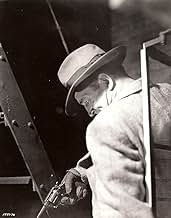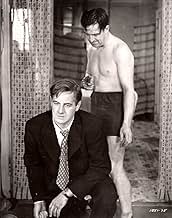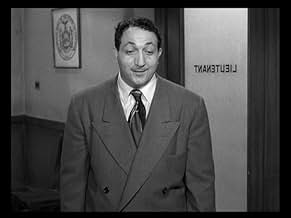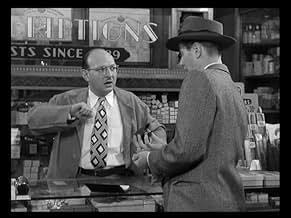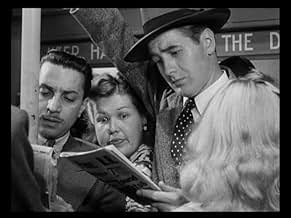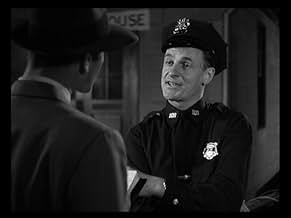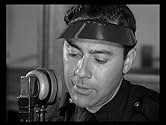IMDb-BEWERTUNG
7,5/10
16.449
IHRE BEWERTUNG
Ein Schritt-für-Schritt-Blick auf eine Morduntersuchung auf den Straßen von New York.Ein Schritt-für-Schritt-Blick auf eine Morduntersuchung auf den Straßen von New York.Ein Schritt-für-Schritt-Blick auf eine Morduntersuchung auf den Straßen von New York.
- 2 Oscars gewonnen
- 6 Gewinne & 5 Nominierungen insgesamt
Ted de Corsia
- Willy Garzah
- (as Ted De Corsia)
Mark Hellinger
- Narrator
- (Synchronisation)
Jean Adair
- Little Old Lady
- (Nicht genannt)
Celia Adler
- Dress Shop Proprietress
- (Nicht genannt)
Janie Alexander
- Girl
- (Nicht genannt)
Joyce Allen
- Shopgirl
- (Nicht genannt)
Beverly Bayne
- Mrs. Stoneman
- (Nicht genannt)
Empfohlene Bewertungen
There were quite a few reasons for wanting to see 'The Naked City'. Like Barry Fitzgerald in a lot of other films ('And Then There Were None' being my introduction to him and still consider his performance in that one of his best), though it was interesting to see him in a lead role rather than his relative usual supporting roles and an atypical one at that. Really like what has been seen so far of Jules Dassin's work, especially 'Night and the City'. Also wanted to see whether the film lived up to its highly influential reputation.
Good news is mostly 'The Naked City' does. One can see why 'The Naked City' was influential in its documentary style, which at the time and even by today's standards innovative, and how it is treated in a way that is driven by its characters and with an emphasis on the police and how they worked. And that makes it a highly interesting film and elevates that is fairly conventional, with familiar genre tropes, in the story department. Yet still makes a gripping film regardless of that.
Not many problems here, though for my tastes Don Taylor seemed bland and detached, not always looking very comfortable either.
Do think that the narration could have been used less, as some of it did not always feel needed.
Conversely, 'The Naked City' is immaculately photographed and New York, like its own character, is a major star here. The cinematography and editing Oscars were richly deserved. The haunting score adds hugely, as does Dassin's direction. Dassin is highly successful in creating an authentic, audacious and sometimes unsettling visual style. He is equally successful at keeping the story at a controlled, yet never in my mind mannered or tedious, way that sustains the suspense brilliantly.
Loved the layered tautness of the script outside of the narration, while the story is gripping and its intelligence, high suspense and a knockout of a final chase made me able to forgive that it was quite conventional. The opening sequence is a unique one. Outside of Taylor, didn't actually have an issue with the performances. Although an effective Fitzgerald has been widely talked about, on both sides of good and not so good (am in the former camp), for me the best performance came from chilling Ted De Corsia.
In conclusion, very good film and deservedly influential. 8/10
Good news is mostly 'The Naked City' does. One can see why 'The Naked City' was influential in its documentary style, which at the time and even by today's standards innovative, and how it is treated in a way that is driven by its characters and with an emphasis on the police and how they worked. And that makes it a highly interesting film and elevates that is fairly conventional, with familiar genre tropes, in the story department. Yet still makes a gripping film regardless of that.
Not many problems here, though for my tastes Don Taylor seemed bland and detached, not always looking very comfortable either.
Do think that the narration could have been used less, as some of it did not always feel needed.
Conversely, 'The Naked City' is immaculately photographed and New York, like its own character, is a major star here. The cinematography and editing Oscars were richly deserved. The haunting score adds hugely, as does Dassin's direction. Dassin is highly successful in creating an authentic, audacious and sometimes unsettling visual style. He is equally successful at keeping the story at a controlled, yet never in my mind mannered or tedious, way that sustains the suspense brilliantly.
Loved the layered tautness of the script outside of the narration, while the story is gripping and its intelligence, high suspense and a knockout of a final chase made me able to forgive that it was quite conventional. The opening sequence is a unique one. Outside of Taylor, didn't actually have an issue with the performances. Although an effective Fitzgerald has been widely talked about, on both sides of good and not so good (am in the former camp), for me the best performance came from chilling Ted De Corsia.
In conclusion, very good film and deservedly influential. 8/10
This is a great Film Noir movie which I enjoyed very much. My favorite part is watching all the 100's of people on the streets on New York City not having a clue that the are immortalized in this motion picture. I love to freeze frame the street scenes and view how life was like in 1948. So many surprises, for example in the phone booth scene, notice the two men peering out the window in the store across the street. I think those guys were aware of the filming, but as the scene continued, they went back to serving their customers. Just plain magic. There is also a cool goof in this film. Note during the train station chase scene, just after Frank runs by, the director or a film crew member turns towards the camera and yells what I believe is "CUT"...So Fun....I'll see again and again and again!
That's just what the producer, Mark Hellinger does. He tries to make it clear from the introduction that this is not your average movie. It is not. This entire production tries to accomplish one thing - authenticity. And for the most part, it succeeds.
Before I get to what's right about this movie, let me mention a few of the things that are wrong. Ted DeCorsia overacts. He always overacts. Howard Duff's character, Frankie Niles, is supposed to be a streetwise grifter. How the hell could he be dumb enough to get himself in as many pickles as he did. Anybody who has ever been around the block would know better than to lie to the cops about everything. Just lie about the important things and tell the truth when it won't hurt you. If this guy is a sociopath, he's the dumbest one in town. Although most of the accents are on the money, the incidental dialogue injected into some of the scenes sounds forced and phony. In fact, it sounds like Hollywood trying to sound like New York. Mark Hellinger's narration, by comparison, is not only authentic, it's practically Damon Runyonesque.
Now - what's right. Practically everything else. The location photography is the New York I remember as a kid. While I was watching some of the hot summer scenes downtown, I could practically smell the asphalt, melting tar, and garbage. Don Taylor's brick duplex in Queens was just the kind of house that every struggling family on the wrong side of Brooklyn aspired to.
I won't comment on the story except to say, it's an entirely believable crime story. I seem to remember Barry Fitzgerald playing a similar role in Union Station. Reminds one of the old days when most of the cops were Irish - and New York was really New York.
Before I get to what's right about this movie, let me mention a few of the things that are wrong. Ted DeCorsia overacts. He always overacts. Howard Duff's character, Frankie Niles, is supposed to be a streetwise grifter. How the hell could he be dumb enough to get himself in as many pickles as he did. Anybody who has ever been around the block would know better than to lie to the cops about everything. Just lie about the important things and tell the truth when it won't hurt you. If this guy is a sociopath, he's the dumbest one in town. Although most of the accents are on the money, the incidental dialogue injected into some of the scenes sounds forced and phony. In fact, it sounds like Hollywood trying to sound like New York. Mark Hellinger's narration, by comparison, is not only authentic, it's practically Damon Runyonesque.
Now - what's right. Practically everything else. The location photography is the New York I remember as a kid. While I was watching some of the hot summer scenes downtown, I could practically smell the asphalt, melting tar, and garbage. Don Taylor's brick duplex in Queens was just the kind of house that every struggling family on the wrong side of Brooklyn aspired to.
I won't comment on the story except to say, it's an entirely believable crime story. I seem to remember Barry Fitzgerald playing a similar role in Union Station. Reminds one of the old days when most of the cops were Irish - and New York was really New York.
In New York, the model Jean Dexter is found dead in the bathtub of her apartment apparently after committing suicide. However, the coroner concludes that she was actually murdered with a simulation of suicide. The experienced Homicide Lieutenant Detective Dan Muldoon (Barry Fitzgerald) initiates his investigations with Detective Jimmy Halloran (Don Taylor) and his team, and the prime suspect becomes Jean's friend Frank Niles (Howard Duff), who he an alibi but tells many lies in his statement.
The director Jules Dassin from the masterpiece "Du Rififi Chez Les Hommes" and "Night and the City" presents "The Naked City" totally filmed in locations of New York City and with actors interacting with common people on the streets like in the Italian Neo-Realism. The introduction is unique, with the credits narrated by the producer Mark Hellinger like in a documentary, and I do not recall any other movie with this characteristic. The screenplay discloses a great detective story, very well acted with Barry Fitzgerald playing a cynical and smart lieutenant and Don Taylor an inexperienced and family man detective. In the conclusion, the narrator tells that this is one of the 8,000,000 stories of the naked city, in a time where New York City had only this population (against more than 20 million inhabitants of the present days). My vote is eight.
Title (Brazil): "Cidade Nua" ("Naked City")
Note: On 27 May 2016, I saw this film again.
The director Jules Dassin from the masterpiece "Du Rififi Chez Les Hommes" and "Night and the City" presents "The Naked City" totally filmed in locations of New York City and with actors interacting with common people on the streets like in the Italian Neo-Realism. The introduction is unique, with the credits narrated by the producer Mark Hellinger like in a documentary, and I do not recall any other movie with this characteristic. The screenplay discloses a great detective story, very well acted with Barry Fitzgerald playing a cynical and smart lieutenant and Don Taylor an inexperienced and family man detective. In the conclusion, the narrator tells that this is one of the 8,000,000 stories of the naked city, in a time where New York City had only this population (against more than 20 million inhabitants of the present days). My vote is eight.
Title (Brazil): "Cidade Nua" ("Naked City")
Note: On 27 May 2016, I saw this film again.
Can film noir work in broad daylight - surely a contradiction in terms..? Well, here, it's attempted and largely pulled off by director Jules Dassin with a down-to-earth almost documentary realism which fully involves the viewer in the action as the well-known tag-line "1 of 8,000,000 stories" (the murder of a pretty female immigrant who's fallen into bad company and criminal habits) is played out over a three-day period in a sunny summery New York cityscape. William Daniels' excellent photography captures a city constantly on the move with its own citizens as accidental extras and actual locations as would-be film-sets. Just as effective is the natural vernacular dialogue with some great one-liners thrown in - none better than Barry Fitzgerald seemingly admiring the rear view of a retreating beautiful female suspect with the remark to a junior colleague "Beautiful long legs she has, wouldn't you say?" to which the underling readily concurs only for old pro Fitzgerald to snap "Keep them in sight for the next 48 hours!" detailing a tail on her. There's also another great scene where the murdered girl's mother berates to all and sundry her dead daughter for her reckless lifestyle and bringing of shame onto her family right up until she is taken to identify the corpse where she breaks down uncontrollably, her maternal feelings restored. The murder tale is slightly convoluted but reasonably easy to follow, no contrived clever-clever plotting here, just an everyday relatively uncomplicated murder, solved by routine police work which makes the headlines due to the beauty of the victim. There's close attention paid to forensics and even the insertion of scenes where perennial sad hoaxers come forward to either claim to solve the murder or even confess to it. The acting is mostly good, Fitzgerald is dapper and spot-on as the world-weary 'tec and his supporting officers all acquit themselves well too. The playing however of some of the criminals gets a little overwrought at times and jars the mood slightly. The film arrives at a reasonably exciting conclusion high above Williamsburg Bridge before the city goes back to sleep awaiting its next story... All done and dusted in 90 very watchable minutes, this is a very entertaining film-blanc I suppose you'd have to call it.
Wusstest du schon
- WissenswertesMost of the street scenes were shot on location in New York without the public's knowledge. Photographer William H. Daniels and his uncredited assistant Roy Tripp filmed people on the streets using a hidden camera from the back of an old moving van. Occasionally, a fake newsstand with a hidden camera inside was also set up on the sidewalk to secretly film the actors. Director Jules Dassin hired a juggler to distract the crowds and also hired a man to occasionally climb up on a light post and give a patriotic speech, while waving an American flag to get the crowd's attention.
- PatzerDuring the end pursuit, Garzah walks past a plump, dark-haired lady in a floral dress, pushing a baby in a stroller. As Donahue pursues in a following scene, he passes the same woman, now walking without her baby carriage and her left hand bandaged.
- Crazy CreditsThe opening credits are spoken by producer/narrator Mark Hellinger. No credits are seen on the screen.
- VerbindungenFeatured in The Movie Orgy (1968)
- SoundtracksSobre las Olas (Over the Waves)
(1887) (uncredited)
Written by Juventino Rosas
Background music for the girls on swings
Top-Auswahl
Melde dich zum Bewerten an und greife auf die Watchlist für personalisierte Empfehlungen zu.
- How long is The Naked City?Powered by Alexa
Details
- Erscheinungsdatum
- Herkunftsland
- Sprache
- Auch bekannt als
- La ciudad desnuda
- Drehorte
- Produktionsfirmen
- Weitere beteiligte Unternehmen bei IMDbPro anzeigen
Box Office
- Bruttoertrag in den USA und Kanada
- 2.400.000 $
- Laufzeit1 Stunde 36 Minuten
- Farbe
- Seitenverhältnis
- 1.37 : 1
Zu dieser Seite beitragen
Bearbeitung vorschlagen oder fehlenden Inhalt hinzufügen

Oberste Lücke
By what name was Stadt ohne Maske (1948) officially released in India in English?
Antwort

